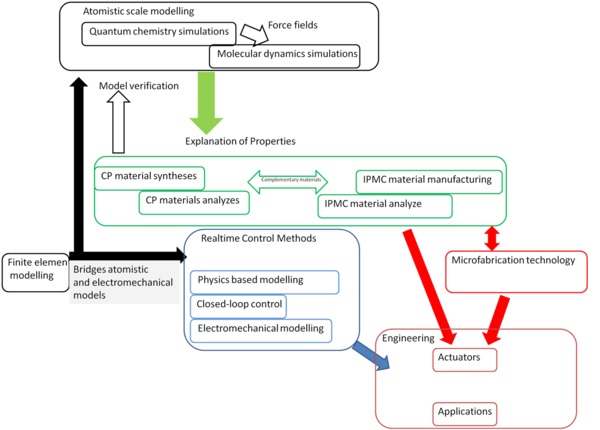Main Page: Difference between revisions
No edit summary |
|||
| Line 1: | Line 1: | ||
=Intelligent Materials and Systems Laboratory= | |||
''IMS Lab'' | |||
Intelligent Materials and Systems Laboratory is an interdisciplinary research group established in 2003 in [http://www.ut.ee University of Tartu], [http://www.tuit.ut.ee Institute of Technology]. | Intelligent Materials and Systems Laboratory is an interdisciplinary research group established in 2003 in [http://www.ut.ee University of Tartu], [http://www.tuit.ut.ee Institute of Technology]. | ||
Revision as of 09:50, 21 August 2009
Intelligent Materials and Systems Laboratory
IMS Lab
Intelligent Materials and Systems Laboratory is an interdisciplinary research group established in 2003 in University of Tartu, Institute of Technology.
Our goal is, by bringing together knowledge from diverse fields of expertise, to develop new materials and their control methods. Exploitation of innovative materials will in turn permit building devices, different and in many ways superior to conventional machines.
The scientific background of our staff as well as the laboratory equipment permits research activities on the borderline of material science, robotics, chemistry, computer science and electronics.
Currently our main research activity is focusing on development and exploitation of ion-conducting polymers. Ion-conducting polymers are a type of electroactive polymers that change their shape and size when electrically stimulated. The behavior of these materials resembles to some extent the behavior of biological muscles and therefore electroactive polymer actuators are often referred to as artificial muscles.
The other research activities in our laboratory are tightly connected with our main research goal. They include computational modeling of direct methanol fuel cells to develop energy recourses that are lightweight and have a longer lifespan, developing underwater robot prototype with a fish-like locomotion and developing learning strategies for mobile robots. Many of these research objectives imply bridging wide gaps between basic and applied sciences or between research and practical applications. We therefore aim at developing several proof-of-concept applications, for example such as a robot with artificial muscles, to demonstrate the potential of these new enabling technologies and to identify the main research problems that have to be tacked.
Besides our research activates the staff of our laboratory is also involved in education. We teach courses on computational physics, innovation and problem solving, biologically inspired robotics and coordinate the Robotics Club of University of Tartu. We also supervise course projects and master thesis related to our fields of competence. Many undergraduate students are actively participating in our research activities.
